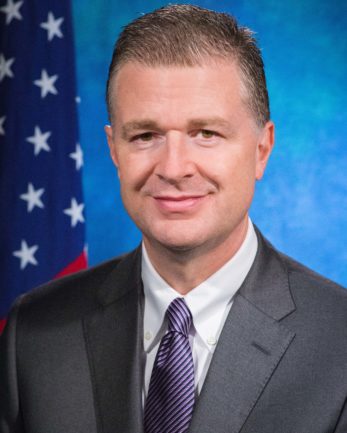Research
Special Projects
Biden Administration International Affairs Personnel Tracker
Daniel Kritenbrink

Assistant Secretary of State for East Asian and Pacific Affairs
Daniel Joseph Kritenbrink is President Biden’s current nominee for Assistant Secretary of State for East Asian and Pacific Affairs. He has served as the United States Ambassador to Vietnam since 2017. Kritenbrink has served as an American diplomat since 1994. He was the Senior Advisor for North Korea Policy at the Department of State in 2017 and served as Senior Director for Asian Affairs at the National Security Council 2015-2017. Kritenbrink served at the U.S. Embassy as Deputy Chief of Mission (2013-2015), Minister Counselor for Political Affairs (2011-2013) and as Political Officer (2006-2009). He also served in Tokyo (1994-1995 and 2000-2004), Sapporo (1995-1997), and Kuwait City (1997-1999). He was Director of the office of Chinese and Mongolian Affairs at the Department of State from 2009 to 2011 and Staff Assistant to the Assistant Secretary of State for Near Eastern Affairs from 1999 to 2000. Kritenbrink speaks Chinese and Japanese.
On China
Kritenbrink is considered a veteran diplomat and China expert. According to his biography on the U.S.-China Economic and Security Review Commission’s website, Kritenbrink served at the U.S. Embassy in Beijing as Chief of the Political Section’s Internal Unit and was Acting Deputy Assistant for East Asian and Pacific Affairs in 2011, where he was “responsible for relations with China, Mongolia, and Taiwan.”
On July 21, 2020, Kritenbrink, as U.S. Ambassador to Vietnam, criticized China’s “mounting campaign of bullying against Vietnam and other claimants” to “push its unlawful maritime claims” and reaffirmed U.S. policy statements’ “commitment to the rule of law in the South China Sea.” Similarly, during the Senate confirmation hearing for his nomination to be U.S. Ambassador to Vietnam on September 27, 2017, Kritenbrink named “upholding international law and resisting coercion in the South China Sea” as part of the U.S. shared interest with Vietnam.
On September 22, 2015, Kritenbrink, as National Security Council Senior Director for Asian Affairs reiterated Ambassador Rice’s statement that the U.S. focus regarding China policy is “on steadily and methodically expanding our cooperation while not shying away from pressing our concerns over our very real differences” and stated that “we’ll continue to engage China to contribute more to addressing global challenges.”
Notable Speeches, Testimony & Commentary
The People’s Republic of China is our biggest geopolitical test. I support approaching the PRC from a position of strength, by working with allies and partners, engaging with international organizations, standing up for our values, and investing in our diplomatic and military capabilities – and the American people. Secretary Blinken has said our approach to China will have competitive, adversarial, and cooperative aspects. The United States will counter PRC attempts to erode the international rules-based order, push back on unfair PRC trade practices, secure critical supply chains, protect sensitive U.S. technology, and build our strength at home. We will continue holding Chinese authorities responsible for the ongoing genocide in Xinjiang, the trampling of autonomy and civil liberties in Hong Kong, and systematic repression in Tibet. We will bolster partners’ capacity to resist PRC intimidation and oppose China’s unlawful maritime claims. We will also cooperate with Beijing when in our interests, such as on the climate crisis, counternarcotics, and nonproliferation. As President Biden has said, we are not looking for conflict but welcome stiff competition and will defend U.S. interests across the board.
“The United States’s Commitment and International Law in the South China Sea,” U.S. Embassy & Consulate in Vietnam, July 21, 2020
“Preview of the State Visit of People’s Republic of China President Xi Jinping,” U.S. Department of State, September 22, 2015
Our strategy vis-a-vis China is, of course, another key pillar of our strategy for the Asia Pacific region. At the same time that we are deepening our relationships across the region, we also are maintaining a high tempo of senior-level engagement with China.
“China’s Foreign Policy: Challenges and Players,” Hearing before the U.S.-China Economic and Security Review Commission, April 13, 2011
We welcome a strong, prosperous and successful China that plays a greater role in world affairs, and we are committed to working with China and the international community on critical global issues….Moreover, we believe that a strong U.S.-China relationship serves to bolster stability and security in the Asia-Pacific region. At the same time, however, we have no illusions about the many obstacles to our cooperation and the many differences that continue to exist between us.
…In closing, I would like to reiterate that our engagement with China is part of a wider strategy that seeks to reaffirm the United States’ commitment to the Asia-Pacific region and encourage China to reach its full potential as a partner in addressing global issues. President Obama has underscored that “the rise of a strong, prosperous China can be a source of strength for the community of nations.” Clearly this is a bilateral relationship of critical importance to the United States and to China.
“U.S. Policy Toward the People’s Republic of China (P.R.C.),” Statement before the U.S.-China Economic & Security Review Commission, April 13, 2011
Media Commentary & Public Perceptions
- “Top US Asia Diplomat Embarks on Swing Through Southeast Asia,” The Diplomat, November 30, 2021
- “Rapping Vietnam ambassador Daniel Kritenbrink tapped as Joe Biden’s top Asia envoy,” South China Morning Post, March 27, 2021
- “Biden’s first 100 days: January to March, China hand to lead East Asia policy,” Nikkei Asia, last updated March 27, 2021
Page Last Updated: December 2, 2021
*None of the personnel in this tracker are associated with the Institute for China-America Studies. All images used on this page are sourced from the official Biden-Harris transition website buildbackbetter.gov or the public domain.*

